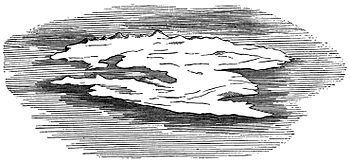of knowledge and the intellectual processes to which they are habituated. They reason as they can on such materials as they have. If they have not learned to observe, they come to conclusions without observations. If they do not know that there are such things as laws of Nature, their inquiries are not directed to find them. If they

Fig. 1.—The Earth floating.
think that the mind is the measure of Nature, they will search in their own reflections for the explanations of Nature; and when they have got out plausible results, or which agree with logic, they will impose their conclusions upon Nature as if they represented the truth. The human mind is essentially active and will make theories; and the

Fig. 2.—The Earth with Roots.
less its knowledge the feebler are the restraints of reason and the bolder the spirit of speculation. We must therefore expect that, in regard to the knowledge of the earth when nothing was actually known about it in early times, there must have been an enormous amount of crude conjecture, futile reasoning, and absurd fancy, or rather much that so appears to us now, although it may have been put forth at first as sober and honest belief.
Aristotle, who lived in the fourth century b. c., and studied Na-
